 Yelp can be a blessing for some businesses and a curse for others. Yelp has a unique filtering system in place for handling the customer reviews that get posted on the site. This system is basically an algorithm that filters certain customer reviews while letting other customer reviews through the filter where they’re posted to the main profile page of the business. Some customer reviews get posted on the main profile page of the business…
Yelp can be a blessing for some businesses and a curse for others. Yelp has a unique filtering system in place for handling the customer reviews that get posted on the site. This system is basically an algorithm that filters certain customer reviews while letting other customer reviews through the filter where they’re posted to the main profile page of the business. Some customer reviews get posted on the main profile page of the business…
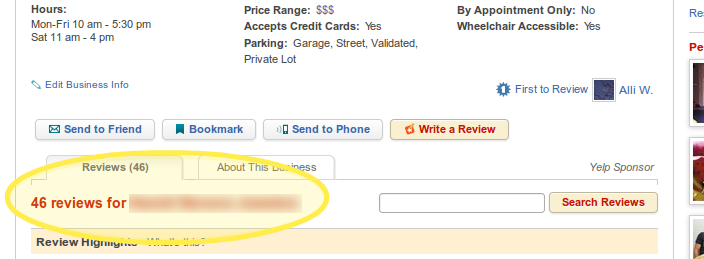
While other reviews get posted on another page that is only accessible by locating and clicking on a small link at the bottom of the business’s profile page.
 The problem for many businesses is that the Yelp algorithm seems to be filtering legitimate customer reviews and posting them on this “filtered reviews” page. The majority of people don’t even know this filtered reviews page exists, so they’re unlikely to ever read any of the reviews that get filtered.
The problem for many businesses is that the Yelp algorithm seems to be filtering legitimate customer reviews and posting them on this “filtered reviews” page. The majority of people don’t even know this filtered reviews page exists, so they’re unlikely to ever read any of the reviews that get filtered.
You can understand why a business owner would be frustrated if they only have a few negative reviews and tons of positive reviews overall, but only a few positive reviews show up on their main Yelp profile page along with an equal number of negative reviews. This customer review consensus is not likely to be indicative of the company’s overall performance, and could be costing the business owner A LOT of potential revenue and new business. If someone does decide to click on the “filtered reviews” link, they are presented with a message from Yelp that sits on top of the filtered reviews.
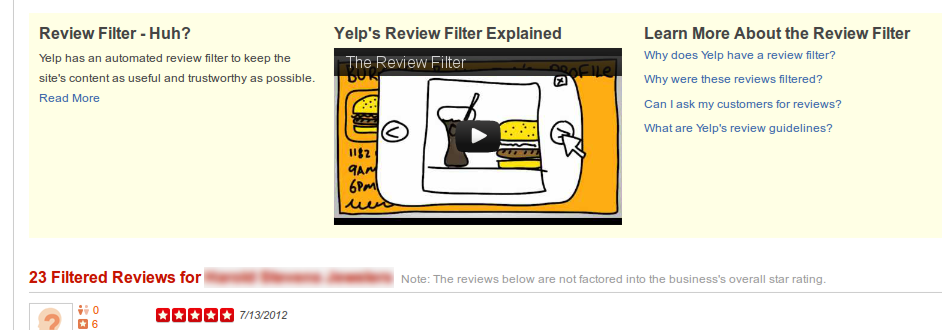
Yelp states that their automated review filter exists “to keep the site’s content as useful and trustworthy as possible”. They provide a video discussing their automated review filter.
They also include links to other commonly-asked-questions and facts about their review-handling process.
Another problem that many businesses are claiming to have is that negative reviews often seem to get through the filter on a greater frequency than positive reviews. I should note here that this second problem is not necessarily due to the Yelp review-filtering algorithm. People expect to be satisfied, and when things go good they often don’t feel the need to tell others about it. When people have a bad experience, they are more likely to leave negative reviews. This would lead to an uneven negative-to-positive review ratio in some cases, and not be indicative of a businesses’ overall performance. Considering This problem, along with the first problem of Yelp filtering seemingly legitimate reviews, and it is clear to see that business owners might have a tough journey ahead of them.
When these negative reviews stay highly visible on the main profile page of the company’s Yelp page, it can do serious damage to reputation and revenue over time. It is important to note that Yelp is used by Apple’s Siri as well, so that increases the reach and impact of a company’s reputation on Yelp. New businesses and companies without a presence on Yelp are quickly recognizing that Yelp is becoming an important aspect of brand management. Unfortunately, the complexity of the Yelp algorithm has created a lot of anxiety for honest business owners trying to manage their brand. Shady service-providers have emerged that are looking to “cash in” on these often-desperate business owners. Quick Google searches like “buy yelp reviews” lead to all kinds of these types of service providers.
Yelp has been known to cause frustration among business owners for many years now. Newspapers and popular blogs have written many “unflattering” stories about Yelp over the years.
Here are a few examples of recent articles discussing Yelp:
- http://www.epicurious.com/articlesguides/blogs/editor/2012/05/the-yelp-extortion-scam.html
- http://www.lawyersgunsmoneyblog.com/2012/01/the-yelp-scam
- http://bits.blogs.nytimes.com/2010/02/24/yelp-is-sued-after-dispute-over-a-review/
- http://www.eastbayexpress.com/ebx/yelp-and-the-business-of-extortion-20/Content?oid=1176635
While there are legitimate reasons to be frustrated at Yelp and it is important to discuss these grievances in a public manner, it is equally important that business owners and marketers not fall into the trap of trying to “game” Yelp by doing things like buying fake reviews. Yelp has been in the customer review industry a very long time and they know that people are trying to game their system daily. They are constantly updating their algorithm and are always on the look-out for scammers and potential scammers trying to game their review system in different ways. Recently, Yelp has really stepped up their efforts at going after people trying to cheat their system.
This New York Times article perfectly illustrates why you don’t want to ever even think about buying fake Yelp reviews. The short story is it appears that Yelp is now “publicly shaming” businesses that get caught trying to buy fake reviews on Craigslist. For example, when you go to the Bert Levi Family Jewelers (Yelp Page), you will see the “Consumer Alert” box appear before you can even read their reviews. You can see the message from Yelp states: We caught someone red-handed trying to buy reviews for this business. We weren’t fooled, but wanted you to know because buying reviews not only hurts consumers, but also honest businesses who play by the rules. Check out the evidence here.

When you click on the “evidence” link provided by Yelp, they show you an image of the e-mail message that the Jewelry company wrote to Yelp’s “undercover agent”. This undercover agent posed as an Elite Yelp Reviewer for this sting operation. “Elite” reviewers are basically active Yelp accounts that have a history of reviews and website interaction.
So, you’re frustrated with Yelp. You know you can’t buy reviews. You also know that unwanted published reviews will only be removed if they violate Yelp’s Terms of Service or Content Guidelines. You know that you’re unlikely to have any effective legal options for dealing with Yelp reviews. What can you do to ensure you maintain a positive reputation on Yelp?
First off, you need to provide a quality service or product along with quality customer service. Second, you need to decide just how important Yelp is to your online presence. In many industries Yelp is one of the most important websites to consider in a brand management campaign, while in other industries Yelp is not really much of a concern.
If your company’s reputation on Yelp is important for your offline reputation, there are some different approaches you can experiment with that are likely to produce good results. As I’ve mentioned before though, Yelp is constantly updating their algorithm. So what seems to be working well for some folks now, may not seem to work at all for other folks tomorrow. All you can keep doing is testing different strategies and learning from your results.
The one thing to remember when it comes to Yelp and most other popular business review websites is that they do NOT want you to directly ask your customers or clients to leave a review of your services. Well, at first, that seems like a pretty silly concept. The most popular business review website in existence does NOT want you to ask your customers to leave a review? Upon further review of their commonly-asked-questions, this policy does start to make sense.
Yelp states: Should I ask customers to write reviews for my business?
Probably not. It’s a slippery slope between the customer who is so delighted by her experience that she takes it upon herself to write a glowing review and the customer who is “encouraged” to write a favorable review in exchange for a special discount. And let’s be candid: most business owners are only going to solicit reviews from their happy customers, not the unhappy ones. Over time, these self-selected reviews create intrinsic bias in the business listing — a bias that savvy consumers can smell from a mile away. Don’t be surprised, then, if your solicited reviews get filtered by Yelp’s automated review filter.
So one of the reasons Yelp doesn’t want you to directly ask your customers or clients to leave reviews is that their automated review filter might place them on the “filtered reviews” page. Imagine a business starts getting a lot of positive reviews from brand-new Yelp users. Maybe the business is running some type of promotion and providing an incentive for their customers if their customers leave them review on Yelp. There is nothing legally wrong with providing incentives like this, provided you are offering the incentives to everyone that leaves a review. You can’t just offer incentives for positives reviews of course.
Let’s say in this example that most of the people leaving reviews are new to Yelp, so they create brand-new user accounts. The problem that might arise in this type of situation is that all of these brand-new user accounts leaving mostly-positive reviews might get flagged and filtered. However, what if a handful of people with active, older, established Yelp user accounts left slightly-negative reviews during this same business promotion? Would these negative reviews pass through the Yelp filter and get posted on the company’s main profile page? This company’s review incentive promotion could actually negatively affect their online reputation if the negative reviews from established and active Yelp users pass through the filter and get posted on the company’s profile page, while the majority of the positive reviews from brand-new Yelpers are filtered and placed into “Yelp Purgatory”, also known as the “filtered reviews” page. As this fictional example illustrates, there are many different outcomes to consider when it comes to incentivizing reviews and dealing with the Yelp filter.
Now is the time to claim your business on Yelp if you have not done so already.
Knowing all of the details regarding Yelp’s filters and their views on soliciting reviews, what is the “best” way to request that your customers or clients leave a review on Yelp…without asking your customers or clients to leave you a review on Yelp? Fortunately, someone on Quora asked a similar question and received a very helpful reply from Yelp employee Luther Lowe.
Lowe first reaffirms Yelp’s position on soliciting reviews and states:
“It might seem counter-intuitive that Yelp actually discourages business owners from asking their customers to write reviews. Why would an online review site discourage review solicitation?
Two big reasons:
Would-be customers might not trust you.
The solicited reviews may get filtered, and that will drive you crazy.”
Lowe explains,
“There is a way to let your customers know you’re on Yelp without being overly solicitous. There is an important distinction between “Hey, write a review about me on Yelp,” [BAD] and “Hey, check us out on Yelp!” [GOOD]. It’s the difference between actively pursuing testimonials and simply creating awareness of your business through social media outlets.”
Lowe then provides three advertising tips for letting people know about your company’s presence on Yelp.
- “Stick a “Find us on Yelp” image on your website and/or print it out for your front counter or window. These have even been spotted on business-branded vehicles. All of these images are available via our Flickr (image sharing) page: http://www.flickr.com/photos/yelp/sets/72157623054478330/detail/
- Include a link to your Yelp business listing in your email signature with the words, “Check us out on Yelp!”
- Embed a badge on your website. This handy widget can help you generate the necessary code to do this: http://www.refmobworks.com/yelp.jsp“
In addition to posting Yelp signs and Yelp banners on counters, walls, and tables throughout your business, you should also try to place actual Yelp reviews where your customers can easily view them. One technique you can try is to print out and frame your best Yelp reviews and place them in highly-visible areas. When you print out your Yelp reviews, be sure to enlarge the font size so that the review is big, bold, and easy to read just by glancing at it. When other Yelper’s see these positive reviews placed prominently within your business, they will likely be more inclined to visit your Yelp page and leave their own review. Also, along with Lowe’s tips above, you should ensure that your company’s business details are correct within your Yelp listing. Yelp populates their business listings with public data that is provided to them from third-parties. You are likely going to be on Yelp whether you want to be or not, so you should at least make sure the information listed is accurate. Take advantage of the free social media business tools that Yelp provides. Optimize your Yelp profile the same way you would optimize a website or social media channel.
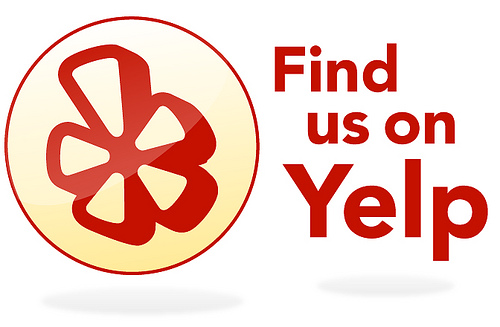
If you do not believe that Yelp is important in your industry or you think that it is not important for your business, you should first check out the top searches people are using on Yelp in your area. You never know, you may be surprised.
Click here to view the Top Searches for Cleveland, OH. You can view the Top Searches for your city by replacing “Cleveland, OH” in the upper-right field with your city of choice, pressing Search, and then scrolling to the bottom and clicking the link “Top Searches” located at the bottom of Yelp’s website.
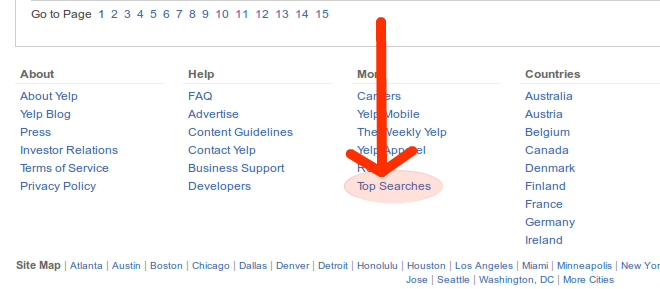
Cleveland’s Top Searches on Yelp…
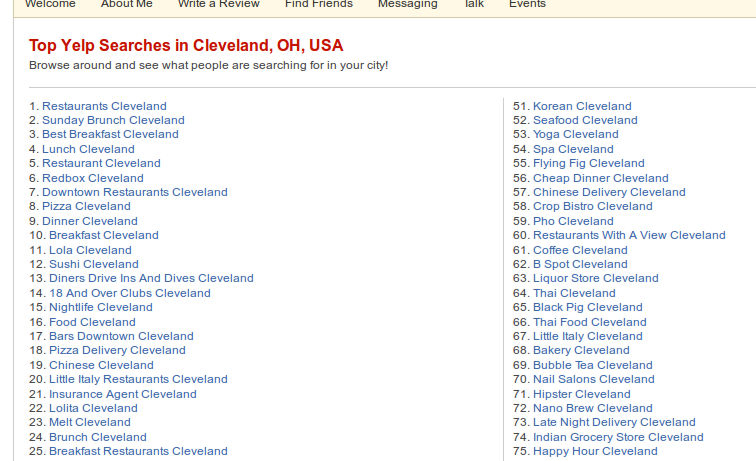
When looking over the example of the top Yelp searches in Cleveland, it is clear to see that some types of industries are getting a lot of searches. Restaurants, bars, food delivery services are receiving a lot of searches from people in that area. If you owned a restaurant or a bar in Cleveland, you could potentially receive a lot of business through your Yelp page. The proof is there and Yelp is telling you what services and products local customers are searching for the most. Use this knowledge to your advantage and make sure that your company’s Yelp page is showing up for any relevant top searches!
Be aware that Yelp encourages business owners to respond directly to customers. Here is a video Yelp produced where they interviewed active Yelp users and they discussed why seeing responses from business owners is important to consumers. Yelp also has a great blog post discussing why business owners should respond to reviews.
You can respond to customers publicly and your response will show up underneath the customer’s review on your page. You also have the option to respond with a private message that only the customer can see. The only requirement for responding as a business is that the business owner supplies a clear photo of themselves in their user profile of the Yelp business account. When responding to reviews publicly or via private message, address customers in a calm and focused manner and avoid getting into any emotional “war-of-words” with people. Let people know that they are being listened to. Let people know that you are always there to help and let them know that you will promptly address any problems that arise.
Staying focused on solutions in your responses, along with analyzing and leaving thoughtful comments on your customer’s reviews, helps you get noticed by the Yelp community. People observe a business owner’s responses and often talk about them with their friends and family, and A LOT of this discussion may take place online somewhere like Facebook or on a popular community forum. Sometimes responses from business owners can even go “viral” if they are particularly unique, charming, helpful, negative, rude, etc.
In addition to ensuring that your Yelp business account is setup properly, I’d recommend creating a personal Yelp account as well. Maintaining an active personal account on Yelp can help you with review management too. The main reason for doing this is that with a personal Yelp account, you can take advantage of all the community tools that Yelp has to offer. Business accounts on Yelp allow you to communicate effectively with your customers, but they place some limitations on how you can interact with the larger Yelp community. Create and optimize your personal account. Start by interacting with other businesses, business owners, and Yelp members in your area. With a personal account you can send a compliment to other Yelp members, you can vote on a review from Yelp members, you can add other Yelp members as a friend, and much more.
One eye doctor in Park Slope implemented a very creative and seemingly very effective review management strategy that helped him deal with his Yelp problems. The doctor was active in social media and was consistently receiving reviews, but he noticed that a lot of his reviews were getting caught in the problematic automated review filter. The doctor started reaching out to the reviewers that had their reviews get stuck in the filter. These were legitimate reviews, but no one was going to see them as long as they were placed on the essentially-hidden “filtered reviews” page.
The doctor contacted every reviewer and thanked them for their post. He told them that the hard work they were putting into leaving helpful reviews was being hidden by Yelp. He shared tips with these Yelp members that helped them complete and optimize their profiles. The doctor sent the reviewer a compliment as well as a message. He also voted the filtered reviews as “useful, funny, or cool”. The doctor also added the reviewer as a friend on his business account. Over time the doctor noticed that many of the previously-filtered reviews came out of the filter and started appearing on his main page.
So what can we learn from the doctor’s experience with Yelp? Well as his story reveals, Yelp is certainly looking for active and helpful reviewers with complete profiles. New Yelp members leaving one review that is only a few sentences long may find their reviews get caught in the review filter. One important point the doctor states is “We’re making Yelpers more credible by helping them reengage with Yelp both passively and actively.” So you want to use the community tools that Yelp provides and reach out to your customers. Let your customers know how they can take advantage of all of Yelp’s community features.
What else can be done to maximize the number of legitimate reviews that do NOT get stuck in the review filter? How do you leave a Yelp review that is likely to be read by everyone in your community? A lot of testing and experimentation has been done over the years. Since the review filter algorithm is constantly evolving, results can vary wildly. However, there does seem to be some general tips and techniques you can follow that may lead to positive long-term results. Try the tips below and your reviews might avoid Yelp’s filter and get displayed publicly in the “right spot”.
- As we’ve discussed, ensure that you complete your public Yelp profile. Include a clear image of yourself and add your location.
- Connect your Yelp profile with your Facebook page. Publish your reviews on Facebook and Twitter.
- Invite people to become friends and create a large, active friend base.
- Follow other popular reviewers in your area and tag other member’s reviews as “Useful”, “Funny” etc.
- Bookmark your reviews and bookmark businesses and other member’s reviews. Keep your bookmarks public.
- Log in from a mobile device with a local IP address and use that mobile device when leaving a review. Use that mobile device to “check-in” at local businesses using the “Yelp Check-In” feature available on the Mobile App for iPhone and Android.
- Only leave reviews in your local area.
- Make sure that your reviews are at least 150-300 words. Make sure your reviews are professional and very detailed. Adding some humor and unique personal stories or opinions to your review can help as well.
- Leave multiple reviews over multiple days. Do not write tons of reviews one day and then only leave one more review a month later. Stay consistent and stay active.
- Try to avoid using “extreme” ratings when you are using a new account. You might find that a 5-star review or a 1-star review gets filtered in some cases when using a newer account.
- When advertising your business, offer a special reward to the “Foursquare Mayor” and other Foursquare users. People that use Yelp a lot likely use Foursquare a lot. So the more Foursquare users that you attract, the higher the chance that you’re also attracting people that actively leave reviews on Yelp. Foursquare users have to use their smartphones to “check-in”, so they will be more likely to leave a review right from their phone.
- BONUS TIP: Host a Yelp event. Interact with all of the Yelp users in your community, starting with Yelpers that have already reviewed your business. From there, you can start interacting with other local Yelpers that have reviewed similar businesses in your community. Next, get in touch with any Yelp Elite members in your community and let them know all about your event. Invite the local Yelp Elite members and reach out to the “Community Manager” to see if they would like to work with you to host the event.


In addition to taking advantage of the free social media tools that Yelp offers Businesses account holders, business owners also have additional options to pursue offline and online. They can spread the word about Yelp’s automated review filter. Chances are the customers in your community don’t even know the automated review filter exists. You could even mention the filter in your current marketing material. Tell people in your community about the review filter using signs, banners, and flyers. Say something like: “Unfortunately, Yelp is filtering our legitimate reviews. Please make sure to click on the “XX filtered” below our reviews to get a better understanding of our overall performance.” Raising public awareness about this review filter issue is important. Maintaining open and honest communication between companies and consumers is not only an important part of commerce, it is also an important part of our culture.
It is also important to focus your branding strategies on other websites and platforms outside of Yelp. The importance of diversifying your efforts cannot be stressed enough when it comes branding and SEO in general. Read over our Basic Guide To Online Reputation Management for a complete overview of all of the unique, rewarding, and popular techniques that can be implemented to help you build your brand.

